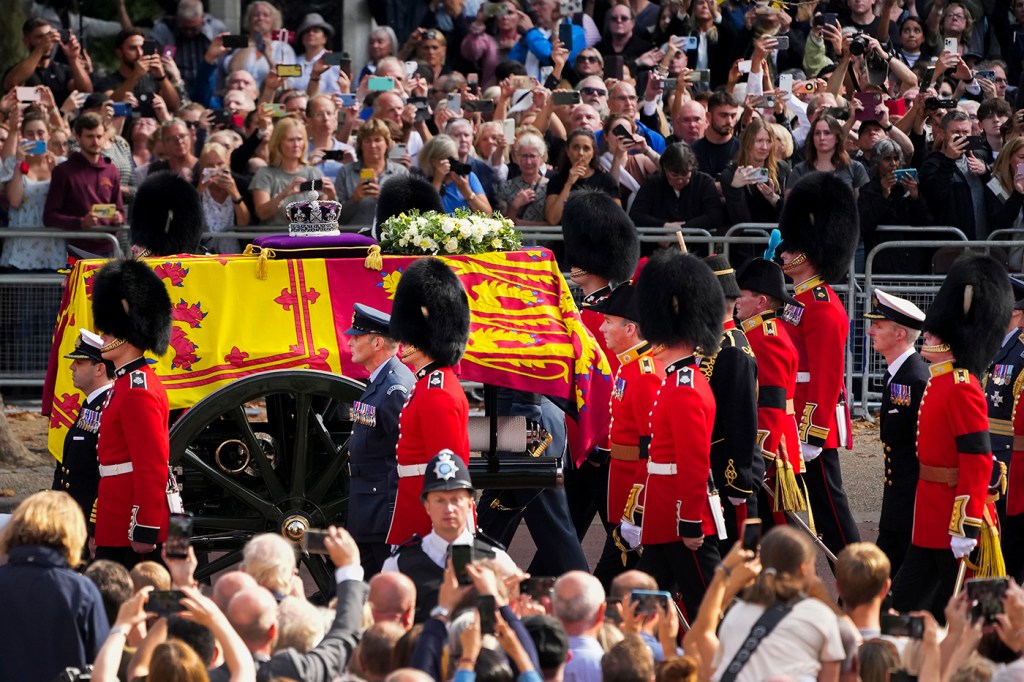Why do so many Americans love the royals? Celebrity, entertainment, uniqueness?

Queen Elizabeth II will be buried at Westminster Abbey on Monday in a televised event that will likely be viewed by billions of people worldwide.
Within the United Kingdom, daily life will come to a grinding halt as citizens pay tribute to the monarch who reigned for 70 years.
Dylan Hakim, a first-year Northeastern student at the university’s London campus, says she was told to stock up on food as many businesses plan to be closed on Monday; her classes were also canceled.
Meanwhile, a line to view the queen’s coffin at Westminster Abbey could reach five miles long for an estimated wait time of 30 hours.
“It’s incredible that we’re here for such a historic moment,” Hakim says.
It may not be surprising to see such a disruption in a country that just lost a well-respected monarch. But the devotion to the royal family transcends the U.K., with some enthusiastic Americans preparing themselves to wake up to watch the 6 a.m. Eastern time funeral.
Why do they care so much about another country’s royal family?
Michelle Carr, a principal lecturer at Northeastern’s College of Arts, Media and Design, lived in London for a period and regularly brings Northeastern students on Dialogues in the U.K. A self-proclaimed “royalist,” she attended the Queen’s Platinum Jubilee and the opening of Parliament.
There, she discovered something unexpected: plenty of Americans. At any given event, she says, over half might be from outside the U.K.
As it turns out, the royals’ following is actually quite large in the United States. Twenty-three million Americans watched the marriage of Prince William and Catherine Middleton, and 30 million watched the funeral of Diana, princess of Wales, in 1997. The Gallery Media Group podcast Royally Obsessed is based in the U.S., but it has over 100,000 followers on Instagram.
Followers of that account are passionate, opinionated and—as of late—emotional.
“Oh my gosh, my heart cannot take it,” one user wrote under an announcement of the queen’s passing. “I hoped this day would never come,” wrote another. “My Heart hurts, I loved the Queen.” “Still doesn’t feel real.”
“Isn’t that so funny considering we had a revolution about this very thing?” NBC News commentator Savannah Guthrie joked in a feature about U.S. fans of the royals.
That may actually be part of the basis of its appeal, says Michael Curtis, a Northeastern second-year student and royals fan.
“When I hear anything about the royal family I jump on my phone,” he says.
Curtis thinks the American fascination with the monarchy comes from its uniqueness as one of the last remaining governments of its kind, as well as its foreignness to Americans. “That idea is something that almost mind boggles Americans,” he says.
Disney may have something to do with it as well, along with the princess culture that many in the U.S. grew up with. “It’s that fairytale fantasy,” says Royally Obsessed podcast co-host Rachel Bowie. “That’s largely where it stems from.”
The royals don’t fail to disappoint in providing a spectacle to match these fantasies. Part of the appeal of the royal family comes from the “scale and scope” of everything royal—from the wealth, to the fashion, to the crowds. “They just want to see the spectacle,” Carr says. “I think it’s because we don’t have that here.”
But Carr also notes that the royal family is a brand, and that much of what we see is part of a concerted effort to promote it. “I think it’s bigger than just people liking them,” Carr says. “They’re one of the top brands in the world bringing in millions of dollars each year.” Royal tourism brings a lot of money into the country, she says.
Big family transitions like births, deaths and weddings ensure that the family’s appeal continues to get attention from new generations. Bowie notes that Royally Obsessed has listeners of all ages, and when a new generation begins—such as with the birth of Prince George—or gets married, it brings in new fans. And fictional representations of the royal family, like the Netflix series “The Crown,” can bring in younger audiences as well.
“That’s where my interest sparked, after watching that,” Curtis says. “Just learning more about the behind the scenes of the institution, it’s really fascinating.”
Of course, there can’t be a fandom if the family isn’t accessible. The fact that fans can see royals in their public lives is actually part of a concerted effort by the English monarchy, Carr says, to continue to survive in the modern world. Elizabeth’s grandparents made changes to the royal family that Carr calls a “rebranding” of the family as celebrities, as they started attending events and appearing in public.
“Prior to that, they lived in their own little bubble. The monarchy was there, but they weren’t in the public sphere,” Carr says.”They slowly became a family that wasn’t just in their castle.”
When Elizabeth was crowned in 1953, it was the first time in history such an event was televised. It was also shown in theaters in the U.S., says Northeastern graduate Brittani Barger, deputy editor at the royals news site Royal Central.
The tabloid culture that feeds fandoms now, however, came about when Charles married Diana, who became princess of Wales.
“That’s when the tabloids went absolutely bananas,” Carr says. “The press had always covered the royal family, but never to that extent.”
Now, podcasts, websites, forums and social media accounts analyze the royals’ every move, speculate on their intentions and interpret their body language, fueled by tabloid culture and the 24-hour news cycle.
As a result, Americans can treat the royals as they do any other celebrity—as a source of entertainment. In the U.K., however, the relationship between the royals and British citizens is more complicated—Britons pay taxes to support the monarchy, which is an integral part of British culture; however, some see the institution as outdated and not representative of the public’s interests. This year, a poll suggested that nearly a quarter of U.K. citizens want the monarchy to be abolished, while 62% support it, The Guardian reports.
Americans, meanwhile, are privileged in that they can be aloof on these matters; instead, they can enjoy the spectacle from afar.
“For us, it’s mostly a form of entertainment,” says Alize Abdelhak, a third-year student majoring in communications and media. “It’s kind of nice to watch when it doesn’t really affect you.”
Regardless of how people feel about the monarchy, it’s unclear how the fandom will evolve without the queen, who was almost universally respected. Now that she’s gone, Curtis says, the popularity of the monarchy “will definitely decline.”
“Queen Elizabeth II was not just a figurehead for her country, but a figurehead for women around the world,” he says. The male heirs, he says, may not fare as well.
Bowie agrees that the fandom may change. “Charles will have big shoes to fill in terms of whether the monarchy can sustain in the same way,” she says. However, there’s a lot of interest in the younger royals, and she notes that her listeners include fans of all ages, many of whom will likely watch the funeral.
For his part, Curtis, who attended the queen’s Platinum Jubilee while in London, plans to watch the funeral from home. “To be able to be there and experience that in person, and then now watching her celebration of life from abroad on TV, it’s going to be pretty cool,” he says.
Regardless of how one feels about the royals, there’s no denying that the funeral will be a monumental moment. Nine out of 10 people in the world have only known one queen in their lifetime, and, as one viral tweet noted, she reigned for 30% of U.S. history.
“Whether you are invested in the monarchy or not, right now this is history happening,” Bowie says.
For media inquiries, please contact media@northeastern.edu.






